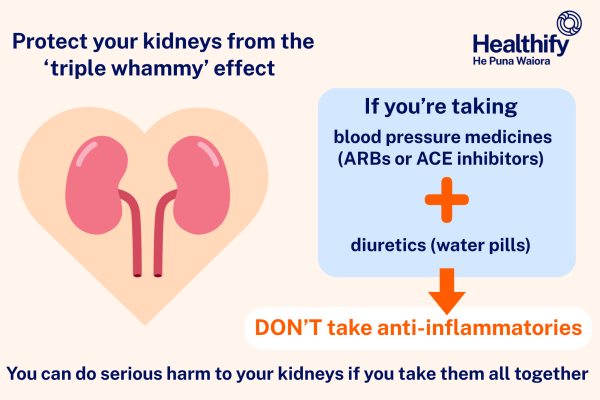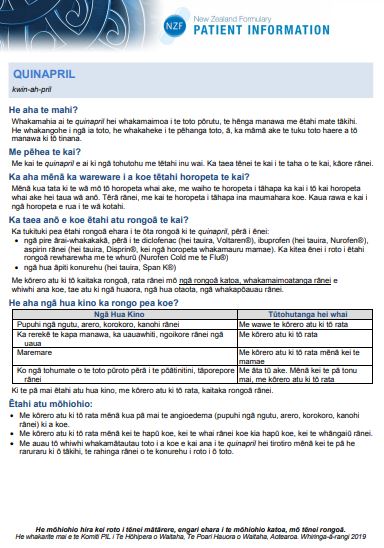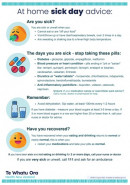Quinapril
Sounds like 'KWIN-a-pril'
Key points about quinapril
- Quinapril is used to treat high blood pressure and heart failure.
- It belongs to a group of medicines called ACE inhibitors.
- Find out how to take it safely and possible side effects.

Quinapril has many different effects on the body and is used to treat a variety of conditions. It belongs to a group of medicines called ACE inhibitors. Quinapril may be used for:
- high blood pressure by relaxing and widening your blood vessels and lowering your blood pressure
- heart failure to help your heart pump blood more easily – this can help to relieve symptoms such as shortness of breath and swelling of your feet, legs and abdomen (tummy).
Quinapril tablets are available in different strengths: 5 mg, 10 mg and 20 mg.
- The dose of quinapril will be different for different people depending on your condition.
- You will usually be started on a low dose so it doesn't make you feel dizzy. Your dose will be increased slowly over a few weeks depending on how you respond. This allows your body to get used to the medicine and reduces side effects.
- Always take your quinapril exactly as your healthcare provider has told you. The pharmacy label on your medicine will tell you how much quinapril to take, how often to take it and any special instructions.
- Check with your pharmacist if your tablets are different to what you expect.
- Timing: Quinapril may be taken once or two times a day. Take your dose at the same time each day. You can take quinapril with or without food.
- Limit alcohol intake while you are taking quinapril. Alcohol can increase your chance of side effects such as dizziness and light-headedness.
- Missed dose: If you forget to take your dose, take it as soon as you remember. But if it is nearly time for your next dose, just take the next dose at the right time. Do not take double the dose.
If you are pregnant or planning a pregnancy
ACE inhibitors can affect your baby's kidneys, especially if it's taken in the second and third trimesters of pregnancy. This can result in long term damage to your baby's kidneys.
If you're already pregnant, talk to your healthcare provider straight away. Usually they will be able to prescribe a different medicine that's safe to take in pregnancy. ACE inhibitors should be stopped by the time you're 12 weeks pregnant at the latest.
Use contraception if you're taking ACE inhibitors and carefully plan any pregnancy with your GP, pregnancy specialist (obstetrician) or hospital doctor. They will want to review your medical condition and medicine before you get pregnant.
Most women stop taking ACE inhibitors before getting pregnant, but some may continue until they have a positive pregnancy test and then stop. Your doctor will discuss what's best for you, based on your medical condition and the risks and benefits of ACE inhibitors.
Severe allergic reaction to an ACE inhibitor
You shouldn't take ACE inhibitors if you've had a severe allergic reaction to an ACE inhibitor in the past, eg, swelling of your face, lips, mouth or tongue (called angioedema). Angioedema is a rare but potentially serious side effect and it can be fatal. It can occur at any time, including in people who have been taking ACE inhibitors for years. Read more about angioedema from ACE inhibitors in the side effects section below.
Here are some things to know when you're taking quinapril. Other things may be important as well, so ask your healthcare provider what you should know about.
Monitoring
Your doctor will arrange for you to have blood tests and blood pressure checks before you start taking quinapril and during your treatment, especially when you first start taking it. This is to check how it is working and to check your kidneys and potassium levels.
Have a sick day plan
If you have diarrhoea or are vomiting from a stomach bug, or are dehydrated from another illness, it’s important to let your GP know, as they may advise you to stop taking quinapril for a few days, decrease your dose and start again when you feel better.
Be careful when taking some pain relief medicines
ACE inhibitors can be used to protect your kidneys from damage if you have diabetes. However, if you are taking quinapril and diuretics (water pills), the combination of these with NSAIDs (anti-inflammatory pain relief medicines) can be very harmful to your kidneys. It can cause acute kidney injury. This combination is called the ‘dangerous trio’ or ‘triple whammy’. You have a higher risk of harm to your kidneys if you are also an older adult (over 65 years) or you're dehydrated.
If you are taking an ACE inhibitor with a diuretic, do not use NSAIDs for pain relief. Talk to your healthcare provider about safe pain-relief options for you. Read more about NSAIDs and protecting your kidneys.
- Examples of NSAIDs are Ibuprofen (Nurofen, Brufen SR), Diclofenac (Voltaren), Naproxen (Noflam, Naprosyn), Mefenamic acid (Ponstan), Celecoxib (Celebrex) and Tenoxicam (Tilcotil).
- Examples of diuretics are furosemide, bumetanide, bendroflumethiazide, chlortalidone, hydrochlorothiazide, indapamide, spironolactone, eplerenone and metolazone.

Image credit: Healthify He Puna Waiora
Read more about the triple whammy effect.
Are you pregnant or planning a pregnancy?
Tell your healthcare provider if you become pregnant or are planning a pregnancy while you're taking quinapril.
Like all medicines quinapril can cause side effects, although not everyone gets them. If you're concerned about any symptoms you think might be related to your medicine, talk to your healthcare provider. The following information offers some guidance but doesn't include all possible side effects.
Common side effects
Tell your healthcare provider if these side effects bother you.
- Headache.
- Upset tummy or feeling sick, constipation or diarrhoea.
- Tickle in your throat, or dry, irritating cough.
- Dizziness, feeling lightheaded or faint when you stand up. This is quite common when you first start taking quinapril and usually goes way with time. Be careful when getting up from either lying down or sitting to avoid falls. These effects put you at risk of falls and injuries, especially if you're an older adult. Stand up slowly. If you do feel dizzy, sit or lie down for a few moments.
Tell your healthcare provider immediately or phone Healthline free on 0800 611 116 if these occur
- Signs of problems with your liver, such as yellowing of your skin or eyes, dark pee (urine) or pain in your abdomen (tummy).
Phone 111 for an ambulance or go to your nearest accident and emergency (A&E) clinic if these occur
- Signs of an allergic reaction such as itchy skin, and rash, swollen lips or tongue, problems breathing, like a tight chest or shortness of breath.
Read more about medicines and side effects and reporting a reaction you think might be a side effect.
The following links provide more information on quinapril.
Accuretic®(external link) Medsafe Consumer Information
New Zealand Formulary Patient Information: quinapril(external link)
Brochures
Quinapril in te Reo Māori(external link) My Medicines, NZ, 2023
5 questions to ask about your medications(external link) Health Quality and Safety Commission, NZ, 2019 English(external link), te reo Māori(external link)
References
- Quinapril(external link) New Zealand Formulary
Brochures

My Medicines, NZ, 2019

At home sick day advice
Health New Zealand | Te Whatu Ora, 2023

Medicines and side effects
Healthify He Puna Waiora, NZ, 2024
Credits: Sandra Ponen, Pharmacist, Healthify He Puna Waiora. Healthify is brought to you by Health Navigator Charitable Trust.
Reviewed by: Angela Lambie, Pharmacist, Auckland
Last reviewed:
Page last updated:





